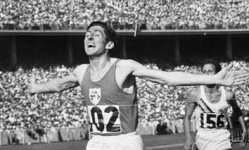The legacy of legend & Olympic champion Ron Delany

His gold at the 1956 Melbourne Olympics changed the way the world looked at Ireland.
By Garry Doyle, The 42
It was just a name; seven little letters, carved into stone yet etched into history. The tourist stood and stared at it, a couple of minutes passing before the chill of a Victorian winter persuaded him to find sanctuary in the stadium museum. There he’d look at Donald Bradman’s bat; an old pair of football boots, a 1937 rugby top.
But he didn’t care. He wanted to go back outside to the concrete pathway encircling this Olympic venue and once again run his eyes over the names on that wall.
As he stood there, a wind came scudding in from the bay, splattering its drizzle across the tourist’s face, making him feel more stupid than wet. Why was he bothered by this list of champions from the XVI Olympiad? It was so long ago you even had teams called the Soviet Union; Yugoslavia; United Team of Germany; Czechoslovakia; Malaya.
All 151 winners are written in white against a brown marble backdrop; starting with Bobby Morrow, the 100m and 200m sprint champion. Charles Jenkins is on the line below, then Tom Courtney.
The man was distracted, however, by this drip-drip-drip of rain sliding down the marble, stopping just were it said: R Delany (Ireland).
He stayed a little longer, thinking about all the other Olympic cities and stadiums around the world where the engravers didn’t have to double-check the spelling of Delany’s country for their respective monuments.
Six months later, the tourist had arrived back home and was at one of those eve-of-Christmas events where people drink too much and talk too loud. Yet when an elderly gentleman, slim and stately, left his seat to walk to the stage, their behavior instantly changed.
At 84, Ronnie Delany moves slowly; his hair tinged with grey, his face thinly lined. He wasn’t there to retrace history’s footsteps, instead to present an award for the sports star of the future. Yet even as he spoke warmly about the precocity of youth, the words he said didn’t leave as big an impact as the reaction of those who heard them.
Most people in that room wouldn’t have been alive when Delany won his gold but everyone seemed aware of the debt they owed him, knowing that if he hadn’t have ran that race and beat that field, then that piece of marble in Melbourne would be just like the stoneworks outside so many other Olympic stadiums.
He’s aware of his legacy. “Every day in life, you wake up an Olympian,” he said from stage, drawing applause. Yet when we subsequently meet inside his south Dublin home, his house isn’t a shrine to his ego. On the walls, there are pictures of weddings, grandchildren and graduations. On the floors, there are carpets and rugs; coasters on the coffee tables; homemade brack wrapped in tinfoil on the kitchen shelf.
It could be any grandparent’s house.
But it isn’t.
It’s the home of a man who woke up one summer’s day in 1956 and knew his destiny was to become Olympic champion. He knew other things too, that three of his rivals, John Landy, Lászlo Tábori and Gunnar Nielsen had held world records; that another finalist, Ken Wood, had claimed to have beaten the 4 minute Mile barrier a few weeks before Roger Bannister had his moment of glory. He also rated Stanislav Jungwirth, a future world record holder and Brian Hewson, the 1958 European champion.
Yet he had a higher regard for himself, a self-esteem borne out of “an idyllic” upbringing; a loving mother, strict but benevolent father, formative years spent in a safe, privileged, suburban home before he won a cadetship to the army. The dream was to be an officer and a gentleman, except the dream didn’t belong to him.
He quit. Eighteen-years-old; aware of how hard it was to find work in post-war Ireland, he left it all behind. “You couldn’t really share your ambition with people in the Ireland of that era, a lot of people thought I was out of my mind,” the 84-year-old says now. “All around me, people were emigrating. Work couldn’t be got. Here I was, in a good, safe job, throwing it all away. I can see why my father didn’t like what I did.
“But it was something I had to do. You see I knew I was good and I don’t want to sound immodest but I felt I could become a great athlete.”
Continue reading at: the42.ie
